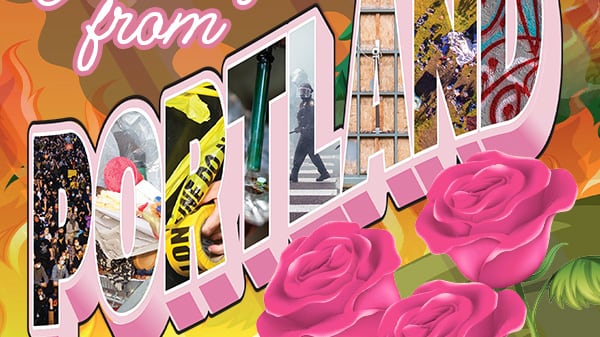Last week, a photographer on assignment for The New York Times rolled up to the city’s newest tourist attraction.
The journalist rode in an unmarked silver squad car and had come to document the open-air fentanyl market operating on Southwest 6th Avenue. She jumped out of the cops’ rig with a camera and began snapping pictures of the tinfoil brigade on the corner.
This was the third time cops had shepherded the Times through downtown Portland in recent years.
Portland Police Bureau Central Bike Squad Officer David Baer said his team had been out with journalists all afternoon. KATU-TV was on the scene earlier. The Wall Street Journal was supposed to visit the day before, but the reporter’s flight got canceled.
Portland is on a short list of destination cities for national media. Rather than a model, however, we have become a cautionary tale.
It wasn’t long ago that the nation’s leading newspapers and magazines regularly wrote the same glowing profile of the Rose City—a lovably weird outpost wedged between the Cascades and the Pacific where colorful (but mostly white) residents pedaled tall bikes while playing the bagpipes, eating Voodoo doughnuts, and slurping elderflower-flavored kombucha.
A 2009 New York Times story headlined “Frugal Portland” captured Portlanders’ “dedication to the things that really matter: hearty food and drink, cultural pursuits both high and low, days in the outdoors and evenings out with friends. It’s the good life, and in Portland it still comes cheap.”
Now, it’s mostly fentanyl that comes cheap. Instead of IPAs and doughnuts, reporters from elsewhere come to chronicle Portland’s drug market, our tent cities, and hapless elected officials. No longer a forward-thinking burg known for recycling, land use planning, and an indie vibe, we are now being characterized as a proto-Detroit, with high-income earners taking their Teslas to the ‘Couv, Bend or Idaho. Even Damian Lillard wants out.
There have always been haters. It’s no secret that Fox News delighted in the violent street theater that followed Portland’s civil rights protests over George Floyd’s murder. What better proof of lefty fecklessness?
But the glum press coverage of Portland’s ills is also rooted in painful truths. (Indeed, much of the national coverage repeats stories WW first reported.) Amid a zeal to level the playing field for people who didn’t partake in the granola utopia, Portland’s leaders neglected basic obligations: housing supply, mental health and addiction services, and public safety. Combine that with the seeming inability of county and city governments to work together and yes, this region really is a mess—it’s little wonder that outsiders want to rubberneck. Success has many fathers. Failure draws cameras to photograph the orphan.
The media attention ranges widely, from sober publications, such as Governing magazine to the left-leaning Verge, with all of the country’s big dailies also searching for an answer to the same question: How did a city with so much going for it screw things up so badly?
“The puzzle,” Governing wrote about Portland in May, “isn’t so much a question of what is happening, but why it is happening.”
Over the past several weeks, our staff has been reviewing what others have said about us recently. We combed through press clippings published since last fall and identified 10 pieces that show how outsiders see us.
It echoes a roundup we published 15 years ago, back when national outlets were trumpeting Portland’s virtues rather than its failings (“PDX Inked,” WW, Oct. 24, 2007). Then, too, we tried to identify the moments when others saw us more clearly than we see ourselves, as well as the places where reporters were waxing profound about what they saw out the Radio Cab window.
We’ve rated each story on a sliding scale: How bleak is the portrait, how much pleasure does it take in our comeuppance, and how obviously is it pandering to an audience in MAGA hats?
Here’s what they’re saying about us behind our backs.
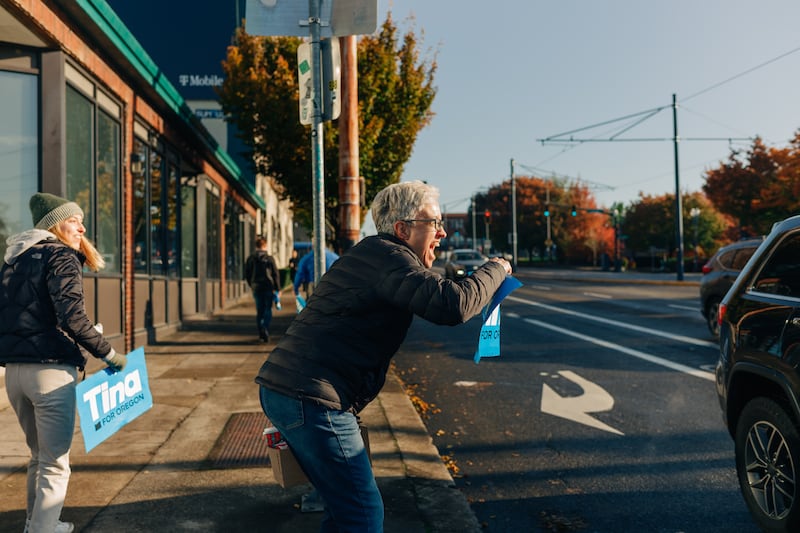
Let’s start with a double feature. In October, The New York Times sent a reporter to weigh the odds of a Republican takeover of Oregon. Two weeks later, Michelle Goldberg, a reliably liberal Times op-ed columnist, followed up with analysis.
“How a Republican Could Lead Oregon: Liberal Disharmony and Nike Cash”
The New York Times, Oct. 16, 2022
“If Oregon Turns Red, Whose Fault Will That Be?”
The New York Times, Oct. 31, 2022
How do they introduce Portland?
The photo atop Goldberg’s column says it all: a homeless woman wrapped in a blanket, under a blue tarp, a fire burning in a toppling fire pit, with three shopping carts in the frame. And it’s raining.
Who was interviewed?
Phil Knight, co-founder of Nike. The two stories both arrived in the few weeks when polls suggested Republican nominee Christine Drazan could seize the governor’s mansion (she didn’t). So the Times talked to a who’s who of political insiders, from Democratic Oregon Congressman Kurt Schrader, who’d lost in the May primary, to An Do, executive director of Planned Parenthood Advocates of Oregon. Plus, it looped in Guy Randles, “a Democrat from Portland” (more on him below).
Most memorable quotes:
“One of the political cartoons after our legislative session had a person snorting cocaine out of a mountain of white. It said, ‘Which of these is illegal in Oregon?’ And the answer was the plastic straw.” —Phil Knight
“Portland, which used to be kinky and weird and a very liberal community, became a very dangerous community where people are no longer enjoying it.” —Kurt Schrader
Least authentic moment:
Quoting Guy Randles and presenting him as an everyman, even though he’s a retired partner at Stoel Rives who got a law degree from Berkeley. “I was picked as a proverbial man on the street for the interview,” Randles says in an email. “I was jogging along the waterfront when the Times reporter, Mike Baker, approached to ask if we could talk. We had a nice chat.”
Most perceptive observation:
Goldberg understood that, to win the governorship, Tina Kotek had to thread a needle. She couldn’t throw Gov. Kate Brown, her predecessor, completely under the bus, but she had to get most of Brown under there to win. “The two biggest issues right now are housing and homelessness, and mental health and addiction,” Kotek declared to the Times. “And I’ll be honest, she’s been absent on that topic.”
How apocalyptic are they? ⛈⛈⛈⛈
How gleeful are they? 😂
How Trumpy are they? 🔴 🔴
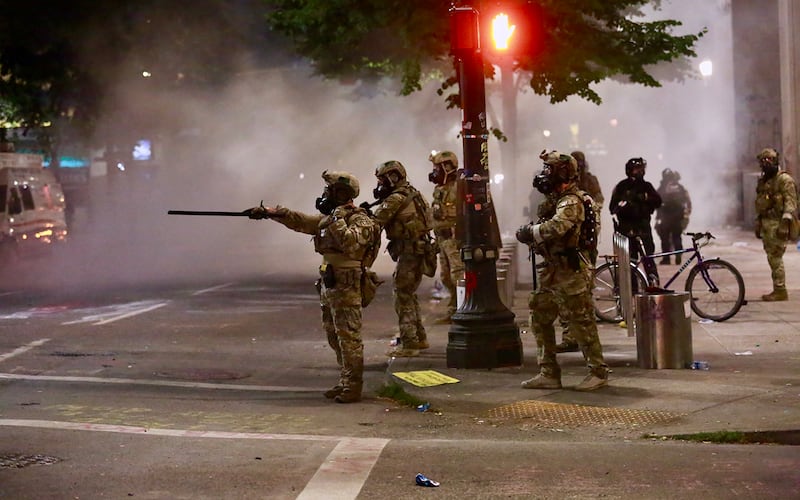
The Verge, Oct. 19, 2022
How does it introduce Portland?
This piece is a bit of an outlier for a national news outlet. For one thing, it’s written by two journalists—Sergio Olmos and Sarah Jeong—who lived in Portland at the time they write about. For another, it’s not about then-current conditions but the time in 2020 when President Donald Trump sent federal agents to quash what had begun as civil disobedience post-George Floyd. As such, it starts on a noir note: “An uncannily desolate city intersection between the back of the federal courthouse and a Starbucks. The headlights of the van are a harsh note in the dim monotones of gray concrete and the brown particleboard that was often boarded up over windows in downtown buildings.”
Who was interviewed?
Mark Pettibone and Evelyn Stassi, protesters who describe being abducted by federal authorities in unmarked vans in 2020.
Most memorable quote:
“If I hadn’t been radicalized at Reed College, I certainly had been by the time I had gone out into the street, as many times as I did, and seen the things that I saw.” —Mark Pettibone
Most perceptive observation:
Portland will always live in Seattle’s shadow, even when the Rose City is on Fox News and Trump’s hit list. “By late June, four people had been shot inside the [Seattle’s Capitol Hill Organized Protest], with two dead, while Portlanders were busy setting small fires inside garbage cans and playing Frisbee.”
What’s the diagnosis?
Trump’s sending in the shock troops was the root cause of Portland’s ongoing malaise. The president set out to make an example of the city, and succeeded in both traumatizing and fracturing its residents.
What’s the solution?
Local solutions for local problems. “The feds had done the exact opposite of quelling the protests, and their departure ended up being the most effective crowd control they ever tried.”
How apocalyptic is it? ⛈⛈⛈⛈⛈
How gleeful is it? 😂
How Trumpy is it? 0
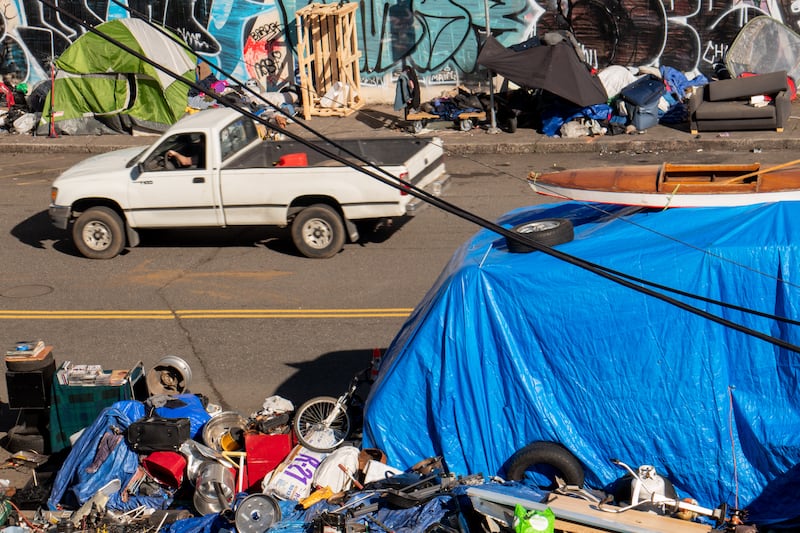
“Portland woman claims it’s a ‘piece of cake’ to be homeless in city”
Fox News, Jan. 3, 2023
How does it introduce Portland?
Fox News characterizes Portland as a place where everyone, including people who cannot afford the city’s stratospheric rents, likes to eat and do drugs. “Many among the homeless population wake up and proceed to repeatedly eat and get high throughout the day,” notes the reporter.
Who was interviewed?
No one. Instead, the Fox News reporter watched a video on Twitter taken by outreach worker Kevin Dahlgren, in which he interviews a former hairdresser living on the streets of Old Town. Dahlgren is the former president of We Heart Seattle, a nonprofit whose controversial street cleanup tactics have generated significant backlash. The story does recycle a prior interview with a North Portland man who told Fox & Friends that businesses and residents are fleeing the city due to homeless encampments.
Most memorable quote:
“It’s a piece of cake, really,” Wendy, the hairdresser, tells Dahlgren about living on the streets of Portland. “They feed you three meals a day and don’t have to do shit but stay in your tent or party.”
Least authentic moment:
Dahlgren says the “piece of cake” quote struck a chord with national media outlets, but much of the attention missed the point. “I’ve never believed it’s ‘a piece of cake’ to be homeless,” he tells WW. “There was more to the story.” Wendy grew up in a conservative family, Dahlgren says, and was frustrated with Portland’s “enablement” of people living on the streets. The story has a happy ending, Dahlgren reports. After the interview went viral, Wendy was reunited with her family and went into detox in Utah.
Most perceptive observation:
“The city’s developing homeless crisis is believed to be a byproduct of a cocktail of other problems, including recreational drug policies implemented in The Beaver State.” It is true that people believe this: 60% of Oregonians surveyed in April said they believe mental health and drug addiction, and not a lack of affordable housing, are the leading causes of homelessness. Whether they believe this because the TV said it is another question.
What’s their solution?
More police. “If you get hurt, you’re screwed because they’re not helping anybody. You don’t see them anywhere,” the story quotes Wendy telling Dahlgren.
How apocalyptic is it?⛈
How gleeful is it? 😂😂😂😂😂
How Trumpy is it? 🔴 🔴 🔴 🔴 🔴
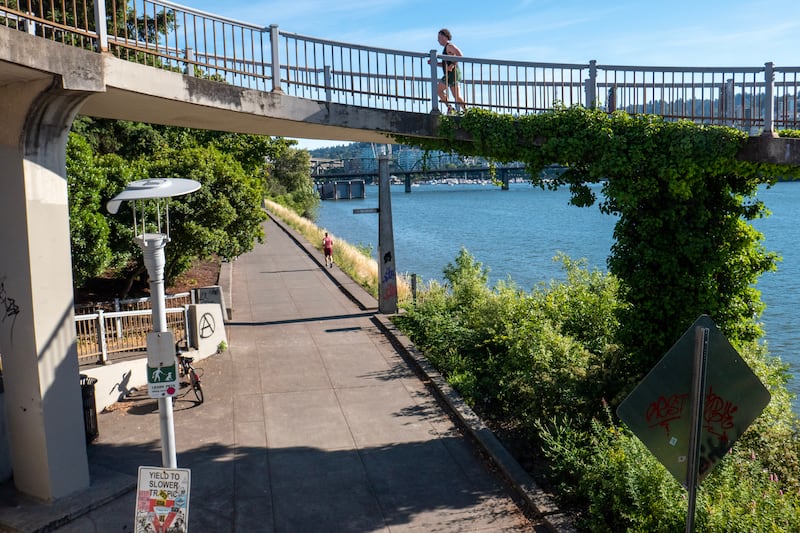
“What’s the matter with Portland? Shootings, Theft and Other Crime Test City’s Progressive Strain”
Los Angeles Times, Feb. 10, 2023
How does it introduce Portland?
With a regular person who knows the score, and some blight porn. “If you want to understand the schism that dominates the political and social landscape in this famously liberal city, a walk down Southeast Rhine Street might be a good place to start. Flora Gonzalez, who lives on the north side of the street, is distressed about conditions in the historically blue-collar neighborhood. The 40-year-old package handler for FedEx said that people have openly dealt drugs and urinated on the sidewalk outside her family’s duplex. They’ve dumped feces and used syringes in her manicured yard, played booming music at 3 a.m. and stripped stolen cars for parts. Shots have been fired behind her children’s bedroom.”
Who was interviewed?
City Commissioner Mingus Mapps; John Toran, founder of Toran Construction; Chet Orloff, an adjunct professor of urban studies and planning at Portland State University; Daisy Quiñonez, former Portland planning and sustainability commissioner; and Josh Lehner, a senior economist at the Oregon Office of Economic Analysis.
Most memorable quote:
“You don’t have to watch Fox News to look around Portland and say, ‘This is not cool.’” —Mingus Mapps
Most perceptive observation:
An anecdote that speaks to how beleaguered Mayor Ted Wheeler is: “A mayor who began his first day in office biking to work was now accompanied by bodyguards.”
What’s the diagnosis?
The Times doesn’t offer one, but it makes clear that moderates are on the rise while the liberals who ran Portland for so many years are on the ropes.
How apocalyptic is it? ⛈⛈⛈⛈⛈
How gleeful is it? 😂😂
How Trumpy is it? 🔴 🔴
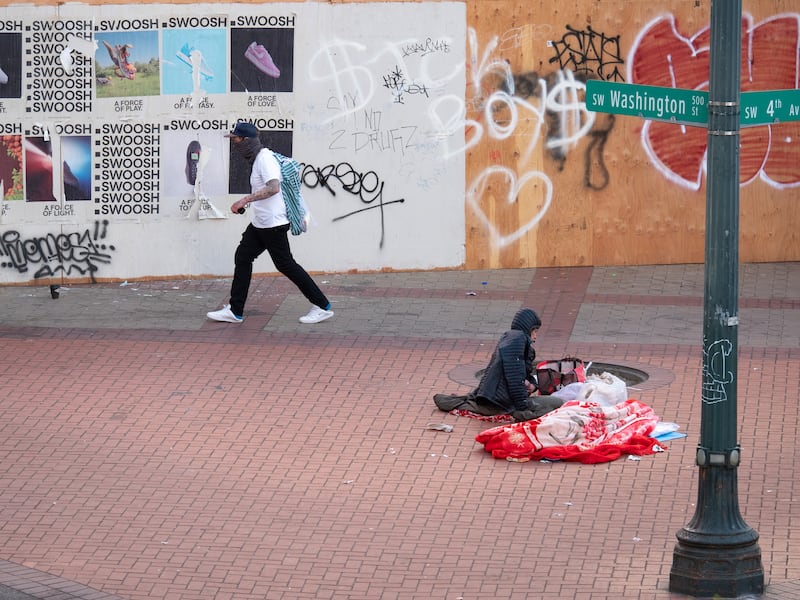
“Oregon decriminalized drugs 2 years ago. What can B.C. learn from its rocky start?”
Canadian Broadcasting Corporation, Feb. 26, 2023
How does it introduce Portland?
With British Columbia decriminalizing small amounts of hard drugs beginning this year, Canada’s public broadcaster (think NPR, but somehow more polite) came to Portland to get a sense of B.C.’s own future. The picture was bleak. “Oregon had more opioid overdose deaths in 2021, the year decriminalization went into effect, than the two years prior,” the CBC notes.
Who was interviewed?
There are glamour shots of both Tera Hurst of the Health Justice Recovery Alliance (“we can be used as either a model for why you should do it, or a model of why we can never do that”) and Portland’s Instagram-famous bike cop, Officer David Baer (“you’re going to see an increase in public drug use”).
Least authentic moment:
When Charles Laprain, an unhoused Portlander, is given a citation for smoking fentanyl, he says he’s “50-50″ on calling the treatment hotline. If he does, he’ll be one of the very few. WW found that out of the hundreds of $100 citations handed out by police in Multnomah County, only five people as of May had managed to get the fine waived by calling the hotline.
What’s the diagnosis?
The CBC compares Portland unfavorably to Portugal, which noted a decline in overdoses after it decriminalized hard drugs back in 2001. Portugal, of course, has universal health care. “Oregon still rates 50th in the U.S. for access to treatment,” the CBC notes.
What’s the solution?
British Columbia has its own problems. There, it can take up to four weeks for a person to get into detox, a doctor told the CBC. Canada has a “Minister of Mental Health and Addictions” and she came down to Oregon to tour last August. The minister, Carolyn Bennett, tells the CBC that the province can take some lessons from Oregon, mainly “funding a variety of community-based treatment organizations ‘to develop the kind of trusting relationships that allow people to think about a different life,’” the CBC says. So, keep doing that?
How apocalyptic is it?⛈⛈⛈
How gleeful is it? 😂😂
How Trumpy is it? 🔴

The Atlantic, March 6, 2023
How does it introduce Portland?
Another flashback to the George Floyd protests and subsequent riots. Downtown Portland on any given night in 2020, according to this cover story in The Atlantic, epitomized a political extremism rooted not in values, but in screaming—just the latest iteration in a centuries-long history of political violence and extremism in America.
“Night after night, hundreds of people clashed in the streets. They attacked one another with baseball bats, Tasers, bear spray, fireworks,” the story begins. “They filled balloons with urine and marbles and fired them at police officers with slingshots. The police lobbed flash-bang grenades. One man shot another in the eye with a paintball gun and pointed a loaded revolver at a screaming crowd.”
Who was interviewed?
Lots of national politicians, Ivy League professors and former prosecutors, who help Atlantic executive editor Adrienne LaFrance fit Portland’s state of chaos into an American anarchist streak that assassinated President William McKinley at the 1901 Buffalo World’s Fair. In Portland, she interviewed Mayor Ted Wheeler, PSU professor and anti-fascism scholar Alexander Reid Ross, conservative talk show host Lars Larson, and WW managing editor Aaron Mesh.
Most memorable quote:
“I do want to emphasize that everyone involved in this was a massive fucking loser, on both sides.” —Aaron Mesh, regarding the dueling factions of costumed brawlers who regularly met for street fights starting in 2016. Mesh, reached by WW across the partition that separates his desk from this reporter’s desk, says he doesn’t regret his remarks but concedes he could have expressed them more gently.
Least authentic moment:
A lengthy elegy for the city’s lost virtues, from its drawbridges to its “swooping crows” and “great Borgesian bookstore,” all diminished by the after-effects of political violence. Portland is pretty. But the effect of this writing is condescending.
Most perceptive observation:
That the 2020 protests devolved into self-indulgent infighting that had little to do with racial justice and everything to do with arbitrary destruction: “The situation in Portland became so desperate, and the ideologies involved so tangled, that the violence began to operate like its own weather system—a phenomenon that the majority of Portlanders could see coming and avoid, but one that left behind tremendous destruction.”
How apocalyptic is it? ⛈⛈⛈⛈
How gleeful is it? 😂😂
How Trumpy is it? 🔴

“Portland’s Curious Case of Urban Discontent”
Governing magazine, March 7, 2023
How does it introduce Portland?
Through the eyes of a reporter who didn’t just show up in Portland to eat Voodoo doughnuts or overreact to the drug crisis du jour. Indeed, Alan Ehrenhalt says he’s a regular here: “Over a bunch of visits during the last two decades, I had the feeling that it wasn’t just a city in Oregon but the capital of New Urbanist success and well-being in America: the best ice cream, the best bookstore, the stateliest of hotels, a glorious riverside park and a compact downtown with hundreds of inviting and/or quirky commercial enterprises.”
Who was interviewed?
Nobody on the record. Most of the intel seems to have come from an anonymous “prominent business executive.”
Most memorable quote:
“Collectively they [government leaders] were incapable of working together constructively.” —The anonymous “prominent business executive”
Most perceptive observation:
Cities, like markets, do not go in one direction forever. Portland’s creative boom fed on a low cost of living. That creativity attracted more people. The cost of living rose—too much. Boom: market correction. “Perhaps there is such a thing as a city being too successful. Decades of peace, prosperity and plentiful amenities may lead not only to managerial complacency but to a panicked reaction among the citizens to even modest increases in such things as crime and homelessness.”
What’s the diagnosis?
The citizenry can afford to pay high rates of taxation, but it wants the services those taxes fund to improve the collective quality of life. In other words, taxpayers want evidence their money makes a dent.
What’s the solution?
“A cohesive local government can do something about the 800 homeless camps. No city can fully control its crime rate, but well-organized and well-resourced policing can make a serious dent in the numbers.”
How apocalyptic is it? ⛈
How gleeful is it? 0
How Trumpy is it? 🔴
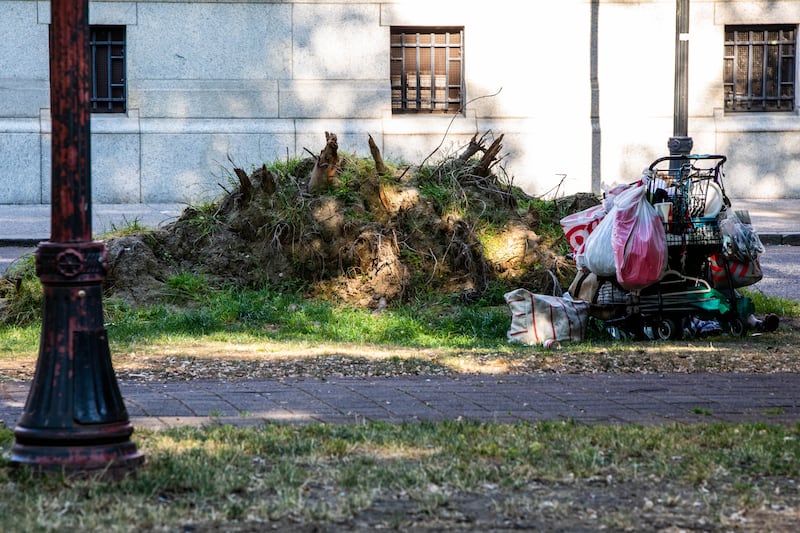
“‘Stick over carrot’: progressive Portland takes a hard turn on homelessness”
The Guardian, May 26, 2023
How does it introduce Portland?
The Guardian, perhaps the U.K.’s most well-regarded newspaper, opens its story on a bright Monday morning, with The Society Hotel owner Jessie Burke, who’s been vocal in recent years about tent encampments and is pleased to see fewer of them.
Who was interviewed?
Burke; a number of social services providers, including Scott Kerman of Blanchet House; and two homeless residents. The story is illustrated by an Associated Press photograph taken on the Central Eastside, showing a man in a tent flying an American flag. It’s the same photo that led the LA Times’ story three months earlier.
Most memorable quote:
“Anyone who works with these populations knows there are people who respond to carrots and people who respond to sticks.” —Jessie Burke
Least authentic moment:
When the author wrote that former City Commissioner Jo Ann Hardesty “ardently opposed enforcing [camping] ordinances, as her constituency of unhoused people gained political power and legal clout.” How people who couldn’t afford to sleep inside had gained power and clout is not answered in the story.
Most perceptive observation:
It’s slim pickings—the piece is a surface-level recounting of the mayor’s daytime camping ban—but the story does accurately perceive that the dramatic rise in unhoused camping has resulted in “changing political winds” blowing rightward in several West Coast cities, including Portland.
How apocalyptic is it? ⛈
How gleeful is it? 😂😂
How Trumpy is it? 🔴 🔴

“Portland Is Losing Its Residents”
The Wall Street Journal, June 28, 2023
How does it introduce Portland?
In classic WSJ style, this story is built around a killer stat: the city’s population decline. “Portland lost nearly 3% of its population between 2020 and 2022, according to the U.S. Census. The drop of about 17,400 to 635,000 was the sixth largest decline among the 50 largest cities.” But rather than focusing on blue tarps and fentanyl-scarred tin foil, the piece focuses on the high cost of housing as the city’s biggest problem.
Who was interviewed?
Mark Rogers, a Portland artist who moved to Fort Wayne, Ind.; Pink Martini bandleader Thomas Lauderdale; and the actress Cassandra Peterson, best known as Elvira, Mistress of the Dark. Peterson provides a counterintuitive example of somebody who recently moved to Portland and is glad she did. “I got really tired of putting on all my makeup and doing my hair to go to the grocery store [in L.A.] for one item,” she said. “Up here, I put my hair in a braid, I wear a flannel shirt, I don’t put on makeup and I go anywhere I want.”
Most memorable quote:
“I have always been a really big booster of Portland, but I can’t recommend it right now.” —Thomas Lauderdale
Most perceptive observation:
It’s by new Indiana resident Mark Rogers, who says low housing costs cover a multitude of sins. “I still love Portland even though it’s got some problems, and I wouldn’t have left if the housing prices weren’t so high.”
What’s the diagnosis?
“Even with the decline in population, housing costs have remained high in Portland, much as they have in other West Coast cities such as Seattle and San Francisco. The prices make it difficult to attract young new residents.”
What’s the solution?
None is offered, but the implication is that morale would improve with more housing stock.
How apocalyptic is it? ⛈⛈⛈
How gleeful is it? 😂😂
How Trumpy is it? 🔴
